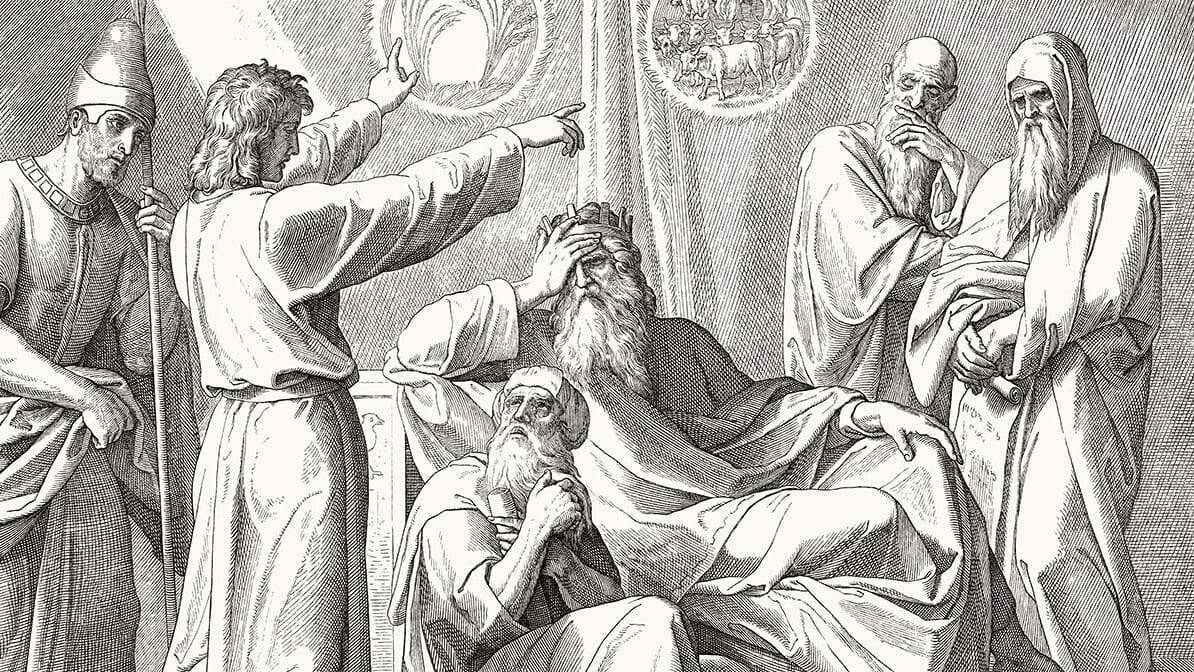- Home
- Spiritual Life
- The Days of Joseph Return

The Days of Joseph Return
 Excerpt taken from Prophetic Forecast: Insights for Navigating the Future to Align with Heaven’s Agenda by Joshua Giles
Excerpt taken from Prophetic Forecast: Insights for Navigating the Future to Align with Heaven’s Agenda by Joshua Giles
Chapter 7
The Days of Joseph Return
What is happening now has happened before, and what will happen in the future has happened before, because God makes the same things happen over and over again.
Ecclesiastes 3:15 NLT
The economies of the nations are in transition. As the reordering and rank of the nations continue to change, you will see Western economies tank and some developing nation economies begin to rise. The Lord says, This decade will be filled with global economic shifts. Money will change hands, and a new monetary system and market will emerge.
God showed me a vision and spoke to me about the days of Joseph returning. These days are actually here even now, as I write this. God gave Joseph a prophetic interpretation for his time in Genesis 45 that still speaks to us today. The Lord had allowed Joseph to know that the nation of Egypt would come into a period of years where there would be abundance, but immediately following would come a famine like they had never seen. Joseph recognized that God had ordered the events of his life so that he could prepare for what was coming and could help preserve the lives of others, especially his family. Just like what happened in Joseph’s time, in a vision the Lord showed me a severe famine and massive shortage coming to the world in our time. A prophecy that is released in the earth realm never dies. Prophecies can be fulfilled, and some can even fail, but if a prophecy is from God, it can never die. I call this a prophetic continuum. It is a series of events that repeats itself at key times in history.
Genesis 41 details a famine so severe that it left many people without food and caused mass death. According to the biblical account, the famine lasted seven years and affected the entire Mediterranean. Archeological and climatological records show that a series of droughts and famines encompassed the civilizations surrounding the Mediterranean at that time in history. The time period of the famine in Joseph’s Day is placed at the end of the Bronze Age. This famine even extended beyond Asia Minor and the Mediterranean. One scholarly article comments, “Greece was affected, and the Mycenean culture, with its luxurious palaces, collapsed.”¹ Other civilizations in the Italian and Greek islands, including Sicily and Sardinia, were destroyed. People of the Hittite empires were displaced and began to wander. History records these events as being due to an extremely severe series of droughts.
This was no ordinary famine; it lasted for years and caused the collapse of some of the well-known civilizations of its time. History also records that several empires came to Egypt for help. Not only had God given Joseph a wise plan of preservation, but Egypt was also situated on the Nile River. Egypt was accustomed to depending on the Nile as a source of water rather than on rain, as other areas of the world did.
By virtue of Pharaoh’s position and God’s master plan, God gave Pharaoh two dreams before any of this occurred. Pharaoh’s dreams are recorded in Genesis 41:1-8:
Then it came to pass, at the end of two full years, that Pharaoh had a dream; and behold, he stood by the river. Suddenly there came up out of the river seven cows, fine looking and fat; and they fed in the meadow. Then behold, seven other cows came up after them out of the river, ugly and gaunt, and stood by the other cows on the bank of river. And the ugly and gaunt cows ate up the seven fine looking and fat cows. So Pharaoh awoke. He slept and dreamed a second time; and suddenly seven heads of grain came up on one stalk, plump and good. Then behold, seven thin heads, blighted by the east wind, sprang up after them. And the seven thin heads devoured the seven plump and full heads. So Pharaoh awoke, and indeed, it was a dream. Now it came to pass in the morning that his spirit was troubled, and he sent and called for all the magicians of Egypt and all its wise men. And Pharaoh told them his dreams, but there was no one who could interpret them for Pharaoh.
Before this time, Joseph had been chosen by God as a seventeen-year-old boy. Genesis 37:2 calls him a lad. He was favored of his father, who gave him a coat of many colors. One time, Joseph brought to his father an evil report about his brothers. This was at the same time that God had given Joseph a couple of symbolic dreams that one day his family would bow before him. The dreams revealed that one day Joseph would become great among his family and among the nations. Yet it is interesting that at this point Scripture calls him a lad. In Hebrew lad is the word na’ar, meaning “the age of infancy, a baby or a child.” In the Yiddish tongue, it means “fool or foolish.” It denotes someone who is emotionally immature.
We see this same word in Jeremiah 1:7, when God called Jeremiah to be a prophet to the nations and told him, “Do not say, ‘I am a youth [na’ar],’ For you shall go to all whom I send you, and whatever I command you, you shall speak.” At the time Jeremiah received this word from God he was around the age of seventeen, the same age as Joseph. So the Scripture calls one lad young and foolish, and to the other lad God says, “Do not say you are young and foolish.” These two were the same age, but they had different levels of emotional and spiritual maturity. For this reason, Joseph had to go through a series of intense and severe training sessions. God was not being cruel to him; He was taking him through a process where he would build character, maturity and favor.
You have probably heard Joseph’s story before. He was thrown into a pit by his own brothers and left for dead. They returned and pulled him out, and then sold him to Ishmaelite slavers for twenty pieces of silver. Afterward, Joseph’s brothers lied to their father, Jacob, and told him that Joseph had been killed by an evil beast (see Genesis 37:12-36). Through these horrible events, Joseph’s journey of purpose began. He was brought to Egypt, and it was there that an officer of Pharaoh named Potiphar bought him from the Ishmaelites. Genesis 39:2 (KJV) says, “And the Lord was with Joseph, and he was a prosperous man; and he was in the house of his master the Egyptian.”
Did you notice the change in Joseph’s process? Genesis chapter 37 calls him an emotionally immature boy, while chapter 39 calls him a prosperous man. What caused such a drastic change? In a decade, Joseph had gone through the worst trials of his life. He had been betrayed, left for dead, sold into slavery and eventually falsely accused by Potiphar’s wife, which got him thrown into federal prison. All the while, God was maturing, refining and preparing Joseph to stand in position as a father to Pharaoh, a prophet to Egypt and a preserver of Israel.
When no one else could interpret Pharaoh’s prophetic dream, Joseph did. He told Pharaoh that there would be seven years of plenty, followed by seven years of severe famine. The famine was so devastating that it erupted in five destructive ways. It is very important that we pay attention to what occurred back then, because we will see it happen again in this new era that we live in. First, there was no bread, according to Genesis 47:13. Second, the money failed, as stated in verse 15. Third, verse 18 reveals that the people had no livestock, so they could not work. Fourth, they could not hold onto their land and houses, as mentioned in verse 19. And fifth, the people were moved into the cities, says verse 21. A migration occurred due to the famine.
…
Joshua Giles, Prophetic Forecast: Insights for Navigating the Future to Align with Heaven’s Agenda, Chosen Books, a division of Baker Publishing Group, 2022. Used by permission.
Trending Now
Sign up today for your Inspiration Today Daily Newsletter
Supercharge your faith and ignite your spirit. Find hope in God’s word. Receive your Inspiration Today newsletter now!
Joshua Giles
Joshua Giles is a consecrated servant of the Lord Jesus Christ. He is a USA Today and ECPA best-selling author. Joshua is a sought-after conference speaker. He travels extensively preaching the Gospel of the Kingdom to those of all generations, cultures, and backgrounds. He has had the privilege of ministering the Gospel throughout the world and traveling to over 30 nations including Africa, Europe, Israel, and the Middle East.
Joshua is the Lead Pastor and founder of Kingdom Embassy Worship Center, a thriving ministry based in Minneapolis, Minnesota. He is also the founder of Joshua Giles Ministries and The Mantle Network.
Related Articles
February 26, 2026
Chased by God’s Blessings—How to Attract God’s Blessings and Walk in His Favor
The key to God’s amazing turnaround plan for you to walk in His favor in every area of life. Have…
February 25, 2026
Finish Strong with a Kingdom Mindset
For if you keep silent at this time, relief and deliverance will rise for the Jews from another…
February 23, 2026
The Joy of Being His Workmanship
When life urges us to strive harder and do more, Scripture invites us to rest in a freeing truth:…
February 20, 2026
Stepping Out in Faith When God Calls You to the Impossible
Stepping out in faith often feels uncomfortable—especially when God calls you toward something that…
Next Steps To Strengthen Your Walk
Inspiration Today Newsletter
Supercharge your faith and ignite your spirit. Find hope in God’s word. Receive your Inspiration Today newsletter now!
Christian Articles
Find articles to strengthen your walk and grow your faith. We have a wide range of topics and authors for you.
Submit A Prayer Request
We are here for you. Simply click on the button below to reach us by form, email or phone. Together we will lift our hearts and voices with you in prayer.





